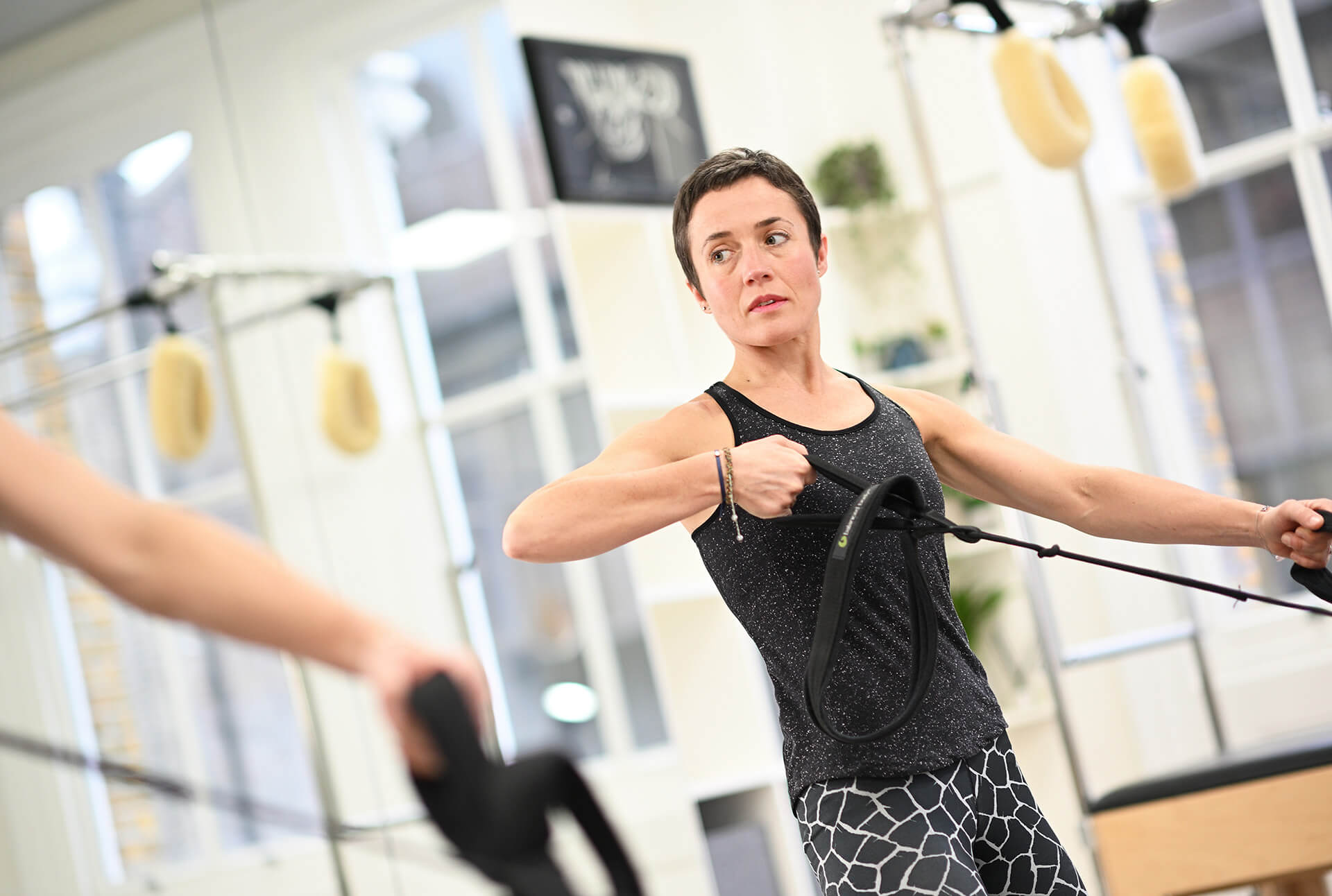Did you set a new year’s resolution last year? Maybe to exercise and get fit but by the middle of January, you’d fallen off the bandwagon? Had you lost your motivation?
January is that time of year where we’re all setting goals. We’re thinking about what we want to achieve for the year as well as dropping those extra pounds poured on over Christmas!
January is also Lead a Balanced Life Month, So we spoke to our instructors and asked them how they lead a balanced life and how they motivate themselves to exercise and keep fit, and we want to share those tips with you.
Tip number one – Get a workout buddy.
No one’s going to stand up their best mate, right? So if you know you’ve got someone coming with you to do your workout, you’re much more likely to stay on track. It gives you accountability. The other thing about working out with a friend or in a group of friends is it gives you that social interaction. So that really boosts the whole wellbeing that you get from your exercise, making it more likely to keep you going back and keep you motivated.
Tip number two – Variety is the spice of life.
We hear that all the time, and it is absolutely true with exercise. Our bodies are incredible at adapting and getting used to what we do. So even when we are exercising and thinking we’re doing good, repeating the same exercise over and over again, our bodies are going to get used to it and they’re going to plateau. You’re going to stop seeing those improvements that you want to see and that’s going to get you a little bit disillusioned with what you’re doing making it likely to lose motivation.
Exercise can be so many different things. It doesn’t have to be pounding out the miles on a treadmill in a gym with no windows.
#cardio
You need to include some cardio to be able to get your heart rate up. Also, get your breathing rate up to the point where you’re able to kind of keep a conversation but you’re feeling your heart, and you’re feeling your breathing. The recommended amount of that kind of exercise is that you do 150 minutes per week, ideally at least three days in the week. This really keeps the health of your heart and lungs.
#Strength
Secondly, strength training. Often people are a little bit fearful of this because they think of lifting heavyweights in the gym, but weightlifting is fantastic for all groups. There are different ways you can do strength training, but ideally, we want to be working against some kind of resistance. And if you’re unsure about this, find someone who perhaps does do some weight lifting to do it with you or ask the advice of a trainer in the gym. Perhaps seek the advice of a strength and conditioning coach who can show you how to safely and effectively do what’s best for your body.
#flexibility
Next is the flexibility and stability. We spend quite a lot of time talking about this in Pilates. It’s the kind of thing that comes to mind when you think about Pilates. We want to make sure that our bodies are able to move with ease and effectively. So we’re really looking at slowing things down, looking at the quality of the movement.
Have you got the flexibility you need? Have you got the control and stability in your body to look after your joints and remain injury-free?
Pilates, yoga, or Tai Chi, finding a way of getting that control of your body and really being able to get into your body with mindful exercise achieves the quality of movement we need.
Then, there’s kind of the more dynamic movement, maybe adding in some impact. And again, this doesn’t have to be running, but running is great. Multidirectional movements also really good, so that might be a racket sport, tennis, squash, badminton. It might be a team sport, football, hockey, netball, or it might be that you go dancing, but you’re challenging your body in different directions and adding some impact, adding some loading for your bones to really help maintain your bone density and your bone health.
Overall, exercise has to be fun. So if it’s not fun, you’re not going to do it. You’re going to lose motivation. So make sure whatever you choose, it’s good fun and you give yourself variety so it stays good fun.
Tip number three – Be prepared.
We always have a myriad of excuses as to why we can’t do it, right? So if you’re prepared, you’ve planned out your week, it’s in your diary so you can’t physically put any other social engagements or work engagements in your diary at that time. Get your kit ready, your bag packed, get your water bottle, get into a routine. prepare to make it easy. It’s going to keep you motivated.
Tip number four – Reflect on how you feel afterward.
Now, that might sound a little bit odd, but there’s so much research showing that exercise makes us feel better. It makes us feel good. It enables us to remain more focused in the day, with more energy, and even problem-solve better. Think about how you feel, reflect on it and recognize it in yourself. A really good way of doing this is to write it down, keep it in your diary, keep a little journal. Some people don’t like writing things down, so you might have a different way of doing it. It may be that you’re just in the shower afterward and you think about it. The more you see that it’s doing your good, the more likely you are to keep motivated.
Tip number five – Surround yourself with motivated people.
If we are socialising with people who are positive and happy and motivated, that is going to make us feel better. It’s going to make us more likely to stay motivated and stay on track with those goals that we set at the beginning of the year. If you are on social media and you’re finding that maybe there are some people that you follow that you are comparing and contrasting with that perhaps has a slightly negative effect on you. Even if you think these are people in the fitness industry and they should be making you feel good, sometimes it doesn’t work like that. Unfollow those people. Make sure that what you’re seeing on a regular basis is going to make you feel good and make you feel motivated.
We see quotes all over social media at the moment, which can make us feel positive and motivated. They may even make you want to jump out of bed and do your exercise program. If that’s the case, maybe have it on your phone. Stick it on your bedside table. Have it on your computer screen. Have stuff there that just reminds you to keep motivated and keep on track.
Tip number six – Eat well.
We need to be including a really nice, varied, and balanced diet to give ourselves the nutrition and the energy we need to be able to carry out not only our daily tasks but our exercise as well. This needs to include plenty of fruit and vegetables and macronutrients. The large food groups, the protein, the carbohydrates, and the fats, you need in your diet every day. Think about your diet may be over a week or a month. Don’t feel guilty about maybe one meal that isn’t perfect or a certain drink that you’ve had that isn’t perfect. You’ve got to look at the bigger picture and as long as overall you’re getting a really good balance and you’re not regularly eating processed foods or foods high in sugar that are going to make you feel tired and more lethargic. You’re onto a winner if you’re feeding yourself well.
You might find that you eat out a lot during the week. Maybe you have lunch out because you’re at work or maybe you don’t have time in the evenings. You’re rushed and you end up eating either processed food or takeaways or quick meals from the supermarket. These aren’t going to feed you with the nutrition you need to be able to stay motivated and stay on track. If that’s you, maybe consider having a mail delivery meal box so that you can make it really easy to be cooking well-balanced meals that someone else has planned out for you. You can cook from scratch quickly and easily and know that you’re feeding yourself well.
Tip number seven – Sleep.
Is your excuse that you are always too tired to exercise, and is that because you’re not getting enough sleep? Research shows that if you regularly get six hours or less sleep, then you are at a much higher risk of injury. Your motor skills are reduced and your concentration is really affected, and this is definitely going to affect your ability to stay motivated to exercise. Our bodies need sleep for recovery. So, how many hours a night do you think you’re getting? Do you maybe need to look at your evening routine, your screen time before bed? Addressing these factors can help you gain a better night’s sleep, make you more likely to want to get up and stick to your goals in the morning.
So that’s it. That’s our seven tips to help keep you motivated and on track with your goals. Remember, everybody’s different. You’ve got to find something that works for you. If it’s not a chore and it’s fun, you’re much more likely to stay on track. Make it fit with your life. Find a workout buddy. Find a group of people that want to exercise with you, and you’re much more likely to stay motivated.
Education is key:
These blogs are designed to give information to everyone, however, it is important to remember that everyone is different! If you have not seen one of our therapists and have any questions about injuries, what you have read or whether this may be useful to you, please just ask. We are more than happy to help anyone and point you in the right direction. Our biggest belief is that education is key. The more you understand about your injury, illness and movement, the more you are likely to improve.



